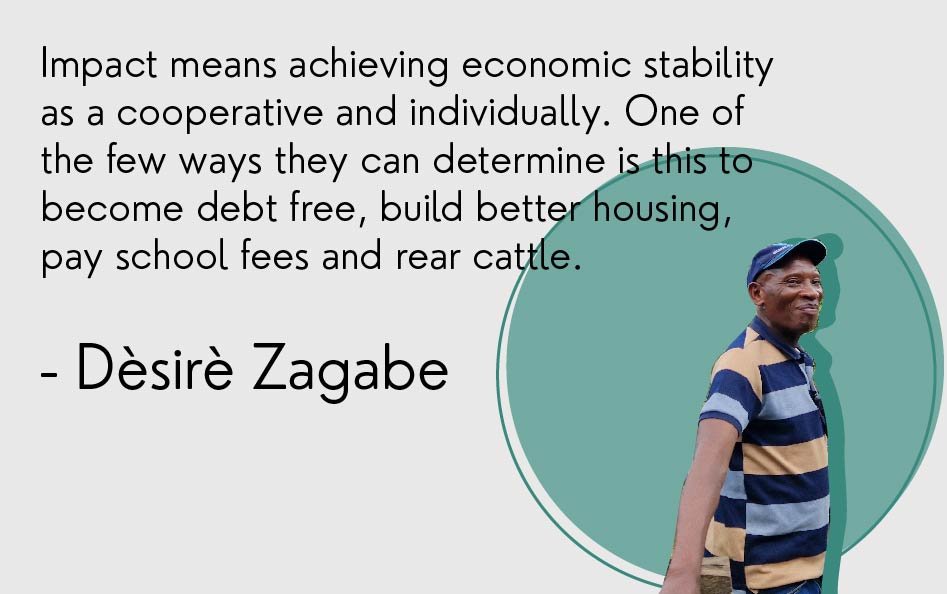COOPERATIVE
RAEK was born, it did so with a clear vision: to offer an economical alternative for women, youth, and those vulnerable to violence in a region deeply affected by poverty and war. Farmers still continue to produce coffee in this region since it is the most profitable crop. It is also part of their cultural legacy to grow coffee in this region. the cooperative also plays an active role in training and certification which reduces the burden of risk on each farmer individually. Alternate sources of income come from intercropping associated with coffee such as beans, soybeans, peanuts and bananas. These crops are harvested twice a year while coffee is harvested only once. Others do small business and small livestock farming. The financial impact it creates in general because of earning an income as a group is also the increased access to credit. The bonus payment incentivizes continue producing coffee.
K4 COFFEES
As far as the K4 coffees are concerned, farmers deliver this as a parchment to the cooperative. They also finish semi-processing the coffees at their home and the quality isn’t completely uniform as more than 50% of the members deliver parchment. There are total of 2103 farmers and out of which 1704 are certified organic. To make the K4 coffees, each farmer approximately brings 300 kgs of cherries. Most often it is approximately the same list/number of farmers who deliver to the cooperative for making this product. But the number increases or decreases depending on when they start buying during the season. For example: in 2022, 517 producers delivered cherry coffee with an average of 268 kg per producer. While in 2023 there will be 479 producers with an average of 301 kg. This means that it varies from one year to another. Even though the financial impact is there but are limited because the quantity sold is too little compared to the quantity produced. In addition, the price at which coffee sold remains to be improved so that producers can find their way. Even though for the other coffees, they get paid per kg of cherry and the cooperative processes it for them into final green beans, K4 is an exception since it is also semi processed by the farmers directly brought to the cooperative to get their support with milling. Therefore the quality imbalance is quite evident due to currently the lack of centralized processing strategy.
CHALLENGES
This challenge of lack of infrastructure is now being actively changed using the funds made available from FBK for elimination of child labor in this region. One of the primary interventions is building of micro washing station as part of capacity building at RAEK. This allows them to buy more than they do now which also directly allows for an increase in the income of farmers creating an upward cycle. The other themes of intervention include making a better business and marketing plan to attract more buyers as well as regeneration of trees/coffee plants to improve the productivity. Read more about the developments of the child labor project here.
DREAMS AND AMBITIONS
RAEK has an ambition of selling 4 containers per harvest season from 2028 onwards. Although they don't have the funds or the infrastructure for that yet, they are taking measures to get there. By building the MicroStation as part of the FBK project, they can increase the production capacity as they would own the infrastructure, the costs to use wet mill will reduce significantly. They also want to work with more farmers to increase exporting volumes. They want to market their coffees by contacting old and new customers, sending them samples to cup and working on improving their presence in the global market. With a focus on regeneration of the coffee trees, they will also be able to increase volumes in the consequent harvest years. Increased volumes directly implies higher income and eventually lower debts, child labor and improved living conditions in the community.
By buying this coffee, it also allows you to support the protecting wildlife against poaching movement. One thing we know is that during the coffee-growing season, all members of the Park's local communities (in the sector of Katana) are busy with various coffee-growing activities, diminishing the pressure on the park through poaching and felling of trees.
ACHIEVEMENT
The price of a kg of cherry for grade 1 went from 0.29USD to 0.50 USD an increase of 42%. They acquired a fund to build 2 MicroStation through FBK project. Farmers received a second bonus payment for the first time in 2022. They managed to clear the debt of 25000 USD from Oxfam in 2021. The number of youth have increased from 8 to 34. They have started spending some funds on marketing their coffee to find more buyers for their coffee. They have also made a plan to start giving out coffee saplings to farmers who can already start regenerating their plots
According to Desire, for the washed coffees, the ratios between the cherry to parchment is 5.4 kg cherries is giving 1 kg of parchment and 700 grams of green bean. K4 is grade B and is derived from the K3 either from pulping or from sorting , lower in density and therefore quality.
The K4 grade last year was a result of coffees left at the washing station after K3 were produced after de-pulping. 50 % of the K4 is also received in the form of parchment from some of the members which makes maintaining the quality very hard. The average production per member is 300 kg of cherries and RAEK has 2103 members. But not all members bring in all their production, as RAEK does not have the capacity to receive it for the following reasons: the drying tables are too small, and apart from TSU there are no other buyers. The fact that RAEK doesn't buy much from its members forces them to sell elsewhere.











